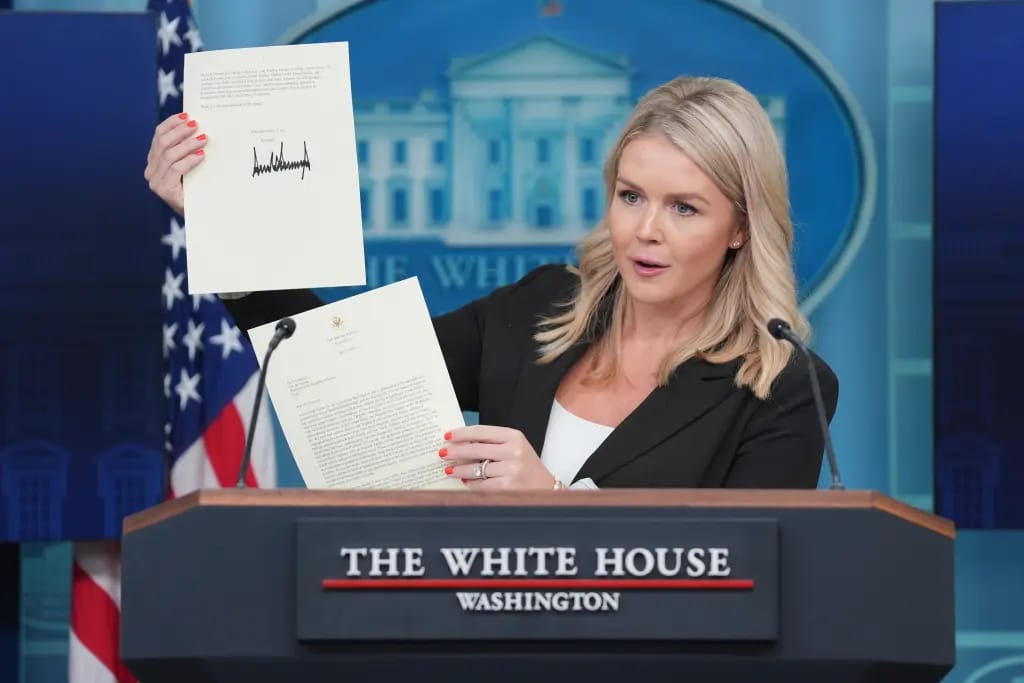- The BLUF
- Posts
- The BLUF - July 8th
The BLUF - July 8th
Good morning everyone,
This is Atlas, and you’re reading the Bottom Line Up Front, where we cover the top geopolitical stories from around the world every Tuesday!
Today’s topics:
Trump Renews Tariff Threats, Countries Face New Deadline
Russian Transportation Minister Found Dead Hours After Being Fired
Gov. Protests In Kenya Lead To Capital Shut Down & 11 Deaths
Trump Renews Tariff Threats, Countries Face New Deadline

White House press secretary Karoline Leavitt holding up copies of the letters sent to Japan and South Korea on tariffs during a press conference on (July 7, 2025) (AP)
By: Atlas
President Donald Trump signed an executive order that moves the end date for reciprocal-tariff negotiations from July 9th to August 1st and directs a fresh batch of notice letters to countries still without agreements. White House press secretary Karoline Leavitt said the documents would leave Washington on July 7th, giving each government three weeks to sign a bilateral deal or accept higher duties on all exports to the United States.
Targeted Rates and Negotiation Prospects
The letters assign duty levels well above the interim 10 percent rate in place since April. Japan and South Korea receive 25 percent, South Africa 30 percent, Laos and Myanmar 40 percent, Malaysia and Kazakhstan 25 percent, Indonesia 32 percent, and Thailand 36 percent. Every notice states that retaliatory increases by the recipient will be matched “point for point.”
Although the language calls the figures final, a clause allows reductions or cancellation if an agreement is signed by July 31st. Seoul is pursuing a digital-trade annex to keep its steel rate below 25 percent; Tokyo seeks auto-parts carve-outs; Jakarta wants acknowledgment of nickel-processing subsidies in exchange for preserving the base 10 percent.
Economic Impact and Domestic Rationale
If all threatened duties take effect, the average tariff on U.S. imports would rise to about 20 percent, compared with 3 percent before Trump returned to office. On July 7th the Dow fell 0.9 percent, Tokyo and Seoul auto shares dropped roughly 4 percent, and Treasury yields edged higher as investors factored in potential inflation. Bloomberg estimates annual revenue could reach $210 billion, which the administration says will partly offset the deficit increase from the One Big Beautiful Bill Act.
Officials justify the move under Section 301 and the April 2nd emergency proclamation, arguing that bilateral trade deficits fund competitor militaries and suppress U.S. wages. The executive-order fact sheet notes that some partners saw lower rates than first proposed, while others were raised “to correct continued trade-barrier discrimination.”
Foreign Reactions and Enforcement Logistics
Japan, South Korea, and the European Union have not published counter-measures but have signaled willingness to respond under WTO rules if talks collapse. EU Commission President Ursula von der Leyen spoke with Trump on July 6th and still aims for a compromise; Brussels warns a 50 percent reciprocal rate is possible if agricultural and digital-tax issues remain unresolved. The White House has also tied an extra 10 percent surcharge to any nation “aligning with anti-American policies,” citing a recent BRICS communiqué that criticized U.S. tariffs and the June strikes on Iranian nuclear sites.
Customs and Border Protection will publish the August 1st schedule in the Federal Register on July 15th. Importers must declare country of origin, and trans-shipment suspicions will trigger higher rates. Goods in bonded warehouses may enter at prior levels if released by August 15th; exclusion requests will be limited and temporary.
Outlook to August 1st
Negotiations will proceed through direct leader calls, staff-level videoconferences, and Treasury modeling of deficit targets. Letters to additional partners may follow, but the initial group covers more than 60 percent of trade still under the temporary 10 percent duty. Business groups advise front-loading shipments and hedging currency exposure, while congressional committees prepare oversight hearings. Whether Japan, Korea, South Africa, and others accept steep hikes or secure concessions will determine if August 1st marks a new tariff regime or prompts another extension.

Subscribe to the BLUF to read the rest.
Delivered Tuesday, get insights into the most pressing geopolitical issues from an intelligence perspective. Stay ahead of the curve with a comprehensive look at the top stories around the world and their implications for you.
Already a paying subscriber? Sign In.
A subscription gets you:
- • Lifetime Rizz
Reply